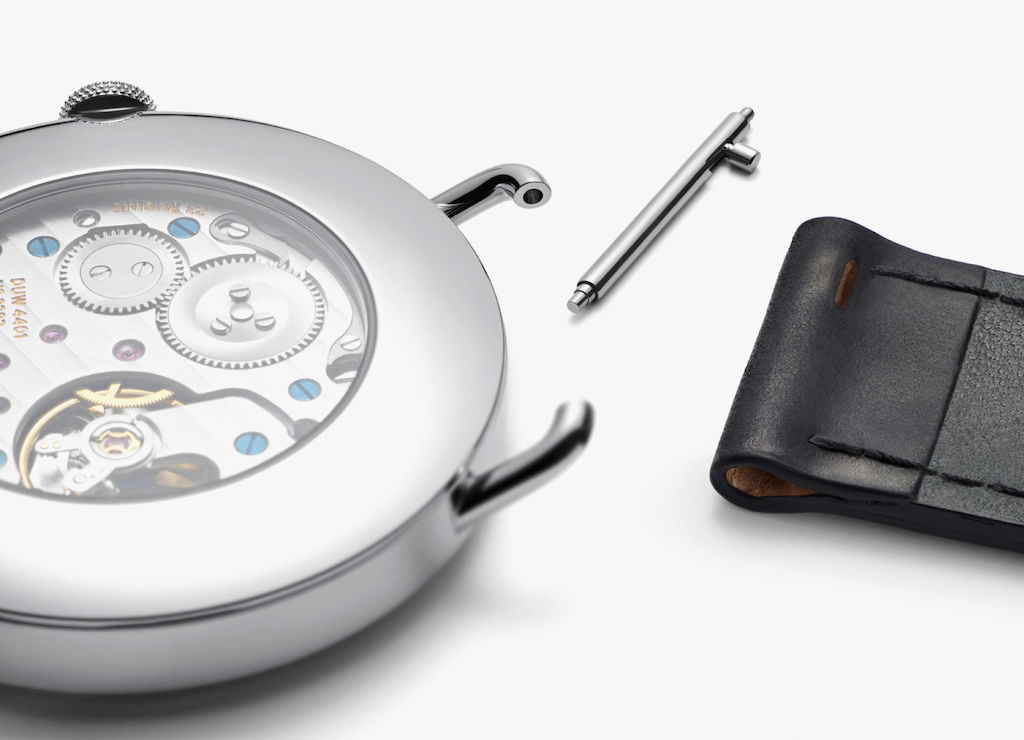Hand-wound watches
1. Winding the watch
Wind your watch by turning the crown clockwise between thumb and index finger until you feel a marked resistance. Your watch will thank you when you do this regularly. When fully wound your watch has a power reserve of at least 42 hours. Models Lux and Lambda even have a power reserve of 84 hours.
2. Winding a watch with a power reserve indicator
Wind your watch by turning the crown clockwise between thumb and index finger until you feel a marked resistance. Your watch will thank you when you do this regularly. Fully wound, your watch has a power reserve of at least 43 hours—which is also displayed on its dial. If the red gauge on the power reserve indicator is completely full, your watch needs to be wound up; you can do so by turning the crown.
3. Setting the date
a) The DUW 4101 and Beta calibers
You can set the date by winding the hour hand between eight and one o’clock. For example, if you need to change your watch from the 1st to the 16th September—perhaps after it spent the holidays tucked away safely in a drawer—then you don’t have to wind the hands 30 times around the dial. Start by simply setting the watch to one o’clock the next day, which will change the date. Then wind the hands counterclockwise to around eight thirty in the evening. Now you can wind clockwise to one o’clock, which will change the date again. When you are setting the time afterwards, please check whether you are setting it to ten o’clock in the evening or the morning—as if you get it wrong, the date will change at midday instead of midnight.
b) The DUW 4601 caliber with quick-change date adjustment
In watches with DUW 4601, the date can be set particularly quickly. In the second crown position—simply pull the crown out a little to access this—you can turn the date forward in a clockwise direction; a good half-turn of the crown advances the date by one day. To avoid confusing morning and evening, set the watch forward to midday after adjusting the date. That way, the date changes at midnight. Please do not adjust the date between 7:30 pm and 12:30 am. The date function is at work during this time so it might lead to the date being inaccurately positioned in the date window, for example. The time can be adjusted in watches with this caliber in the outermost, i.e. third, crown position.
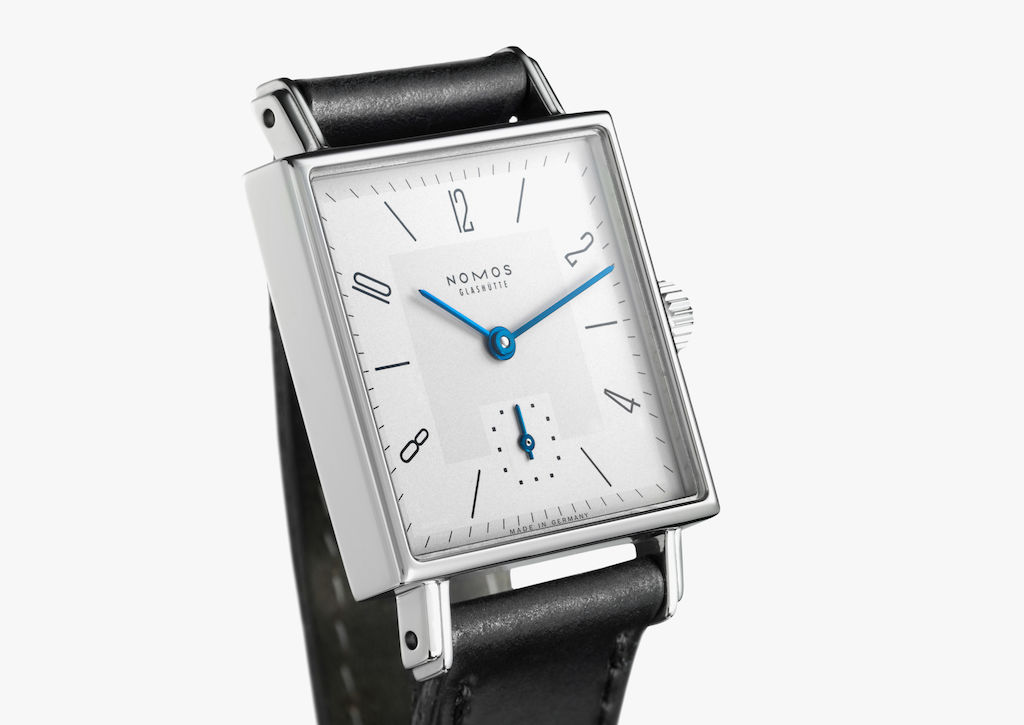
Automatic watches
1. Winding the watch
This watch does not need to be wound, as it winds itself as you move. Alternatively, you can wind it by turning the crown clockwise between finger and thumb. In contrast to hand-wound watches, automatic watches do not have a point of resistance once they are fully wound—but there’s nothing to worry about; with the neomatik calibers (DUW 3001 and DUW 6101) the rotor reduces its rate of movement once the watch is fully wound. If you don’t wear your watch, it will have a power reserve of at least 43 hours after being fully wound—or one hour less for models with a date function (switching the date requires a little extra energy).
2. Setting the date
a) The calibers DUW 5101 and Zeta
You can set the date by winding the hour hand between eight and one o’clock. For example, if you need to change your watch from the 1st to the 16th September—perhaps after it spent the holidays tucked away safely in a drawer—then you don’t have to wind the hands 30 times around the dial. Start by simply setting the watch to one o’clock the next day, which will change the date. Then wind the hands counterclockwise to around eight thirty in the evening. Now you can wind clockwise to one o’clock, which will change the date again. When you are setting the time afterwards, please check whether you are setting it to ten o’clock in the evening or the morning—as if you get it wrong, the date will change at midday instead of midnight.
b) The NOMOS neomatik caliber DUW 6101
Watches with this neomatik caliber can be set even more quickly. In the second crown position—which can be found by pulling out the crown just a little—the date can be set forward and backwards with ease; just a half-turn of the crown will move the date once. Furthermore, DUW 6101 has a very small time frame for the date change: simply avoid resetting the date between 11:15 pm and 0:45 am. If you do so accidently, however, don’t worry; DUW 6101 is constructed so that this will not damage the mechanism. Should the date come to a halt while switching between two dates, simply pull the crown out as far as it will go and set the time to shortly after one o'clock in the morning—or back to 11 o'clock at night. Then the date display will return to its original position.
To set the time, just pull the crown a little further out—into the third position.
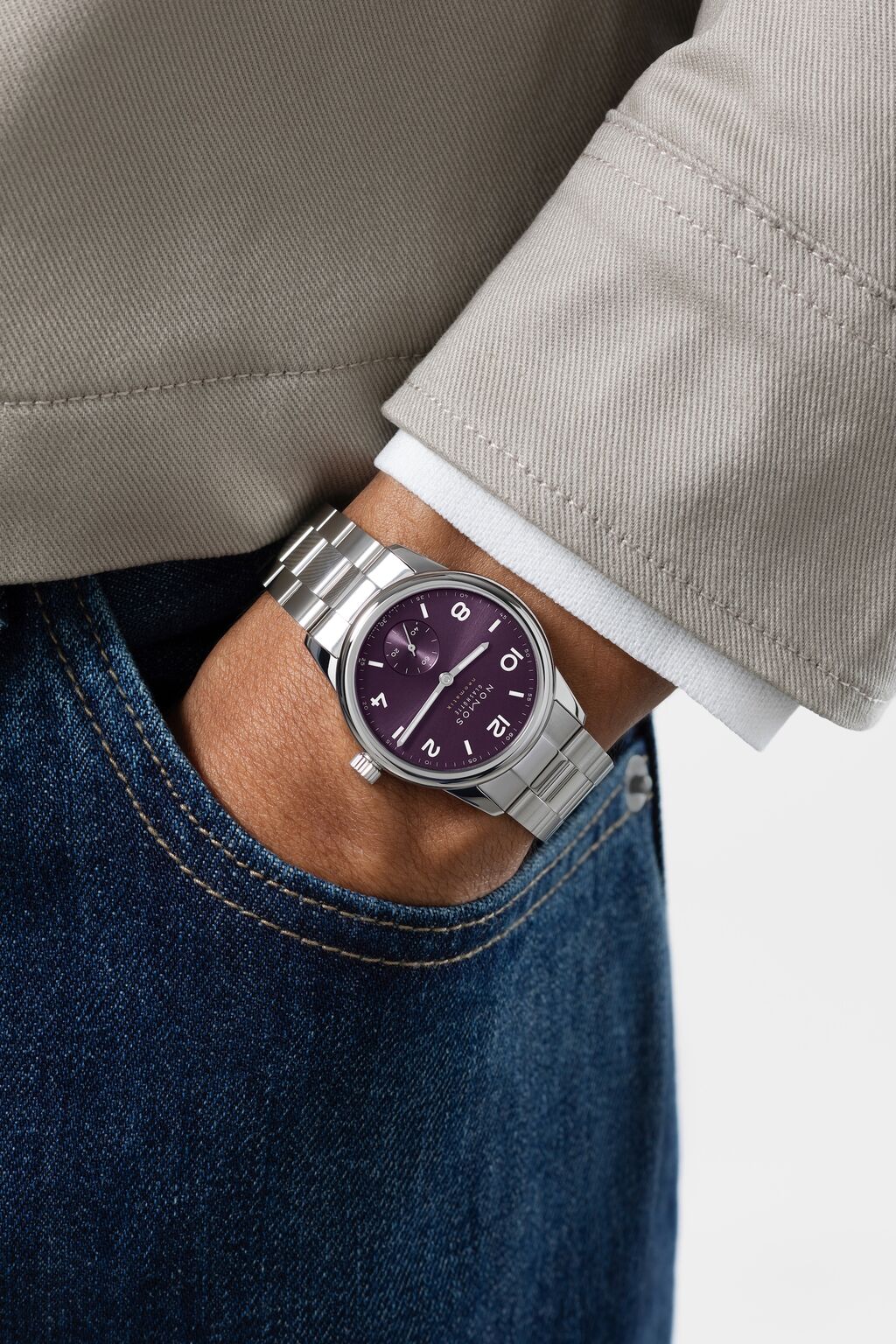
GMT/Worldtimer watches
Setting the time and time zone
A perfectly simple complication: Setting a NOMOS watch with a world-time function is very easy—and accomplished in just three steps.
a. Tangomat GMT
- Set the home time zone: Press the pusher above the crown until the city code representing the time zone you want to select as home appears in the window at 9 o'clock. This could be where you live, or a time zone you often work in.
- Synchronize the dials: Use the setting pin provided with the watch to press the corrector point recessed into the case at 8 o'clock repeatedly—until the hour hand on the main dial indicates the same hour as the one marked with the red arrow in the time window at 3 o'clock. This display is now synchronized with the time zone selected as the home time and remains constant, even if you set a new time zone using the world time pusher.
- Set the current time in the home time zone: Pull the crown to the first position and set the time on the main dial as usual. Pay attention to whether it is day or night in your reference zone and continue turning the hands until the 24-hour display in the window at 3 o'clock also shows the correct time. You can then use the pusher to move to other time zones without losing track of whether it is day or night at home.
b. Zürich Worldtimer
- Set the home time zone: Find the city on the city disk that represents the time zone you want to select as home. This could be where you live, or a time zone you often work in. Press the pusher above the crown until this city name is at 12 o'clock.
- Synchronize the dials: Use the setting pin supplied with the watch to press the corrector point, which is recessed into the case at 8 o'clock, repeatedly—until the hour hand on the main dial indicates the same hour as the time disc at 3 o'clock. This display is now synchronized with the time zone selected as the home time, and remains constant even if you set a new time zone using the world time pusher.
- Set the current time in the home time zone: Pull the crown to the first position and set the time on the main dial as usual. Pay attention to whether it is day or night in your home time zone and continue turning the hands until the 24-hour display at 3 o'clock also shows the correct time. You can then use the pusher to move to other time zones without losing track of whether it is day or night at home.
c. Club Sport neomatik Worldtimer
- Set the reference / home time zone: Find the code on the city disk that represents the time zone you want to select as home. This could be where you live, or a time zone you often work in. Press the pusher above the crown until this code is at 12 o'clock.
- Synchronize the dials: Use the setting pin supplied with the watch to press the corrector point, which is recessed into the case at 8 o'clock, repeatedly—until the hour hand on the main dial indicates the same hour as the 24-hour display on the sub-dial. The main dial is now synchronized with the time zone selected to represent home, and remains constant even if you set a new time zone using the world time pusher.
- Set the current time in the reference / home time zone: Unscrew the screw-down crown, pull the crown to the first position, and set the time on the main dial as usual. Pay attention to whether it is day or night in your reference zone and continue turning the hands until the 24-hour display on the sub-dial also shows the correct time. You can then use the pusher to move to other time zones without losing track of whether it is day or night at home.
Daylight Savings Time
If DST is in effect in your reference / home time zone but not in the time zone you want to travel to, you must repeat the synchronization (via the corrector point, see 2). To ensure the correct indication of the home time zone, make sure that the time disc at 3 o'clock shows one hour earlier than the main display. And reverse this when you return to a time zone with DST.
World-time cities and codes
The city codes on the world-time watches from NOMOS Glashütte represent the following time zones (according to Coordinated Universal Time) without taking daylight saving time into account:
LON (London): UTC 0
BER (Berlin): UTC +1
ATH (Athens): UTC +2
MOW (Moscow): UTC +3
DXB (Dubai): UTC +4
KHI (Karachi): UTC +5
DHC (Dhaka): UTC +6
BKK (Bangkok): UTC +7
HKG (Hong Kong): UTC +8
TYO (Tokyo): UTC +9
SYD (Sydney): UTC +10
NOU (Noumea): UTC +11
AKL (Auckland): UTC +12
PPG (Pago Pago): UTC -11
HNL (Honolulu): UTC -10
ANC (Anchorage): UTC -9
LAX (Los Angeles): UTC -8
DEN (Denver): UTC -7
MEX (Mexico City): UTC -6
NYC (New York City): UTC -5
SCL (Santiago de Chile): UTC -4
RIO (Rio de Janeiro): UTC -3
FEN (Fernando de Noronha): UTC -2
PDL (Ponta Delgada): UTC -1
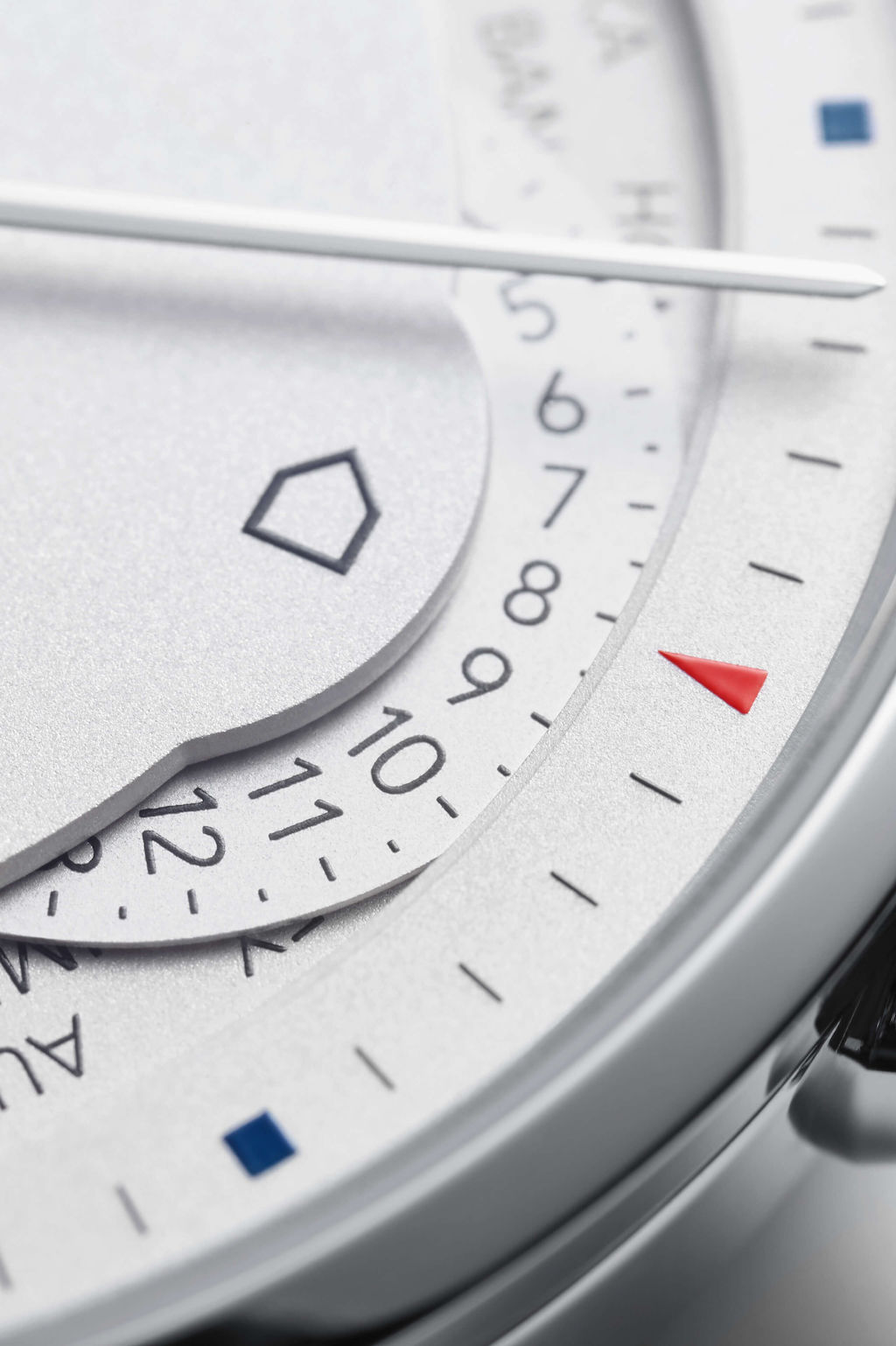
Watches from the NOMOS Atelier
Winding a watch with twin mainspring barrels
Wind your watch by turning the crown clockwise between thumb and index finger until you feel a marked resistance. Your watch will thank you when you do this regularly. Fully wound, your watch has a power reserve of at least 84 hours due to its twin mainspring barrel. This also means the crown needs a few more turns until both barrels are fully wound.
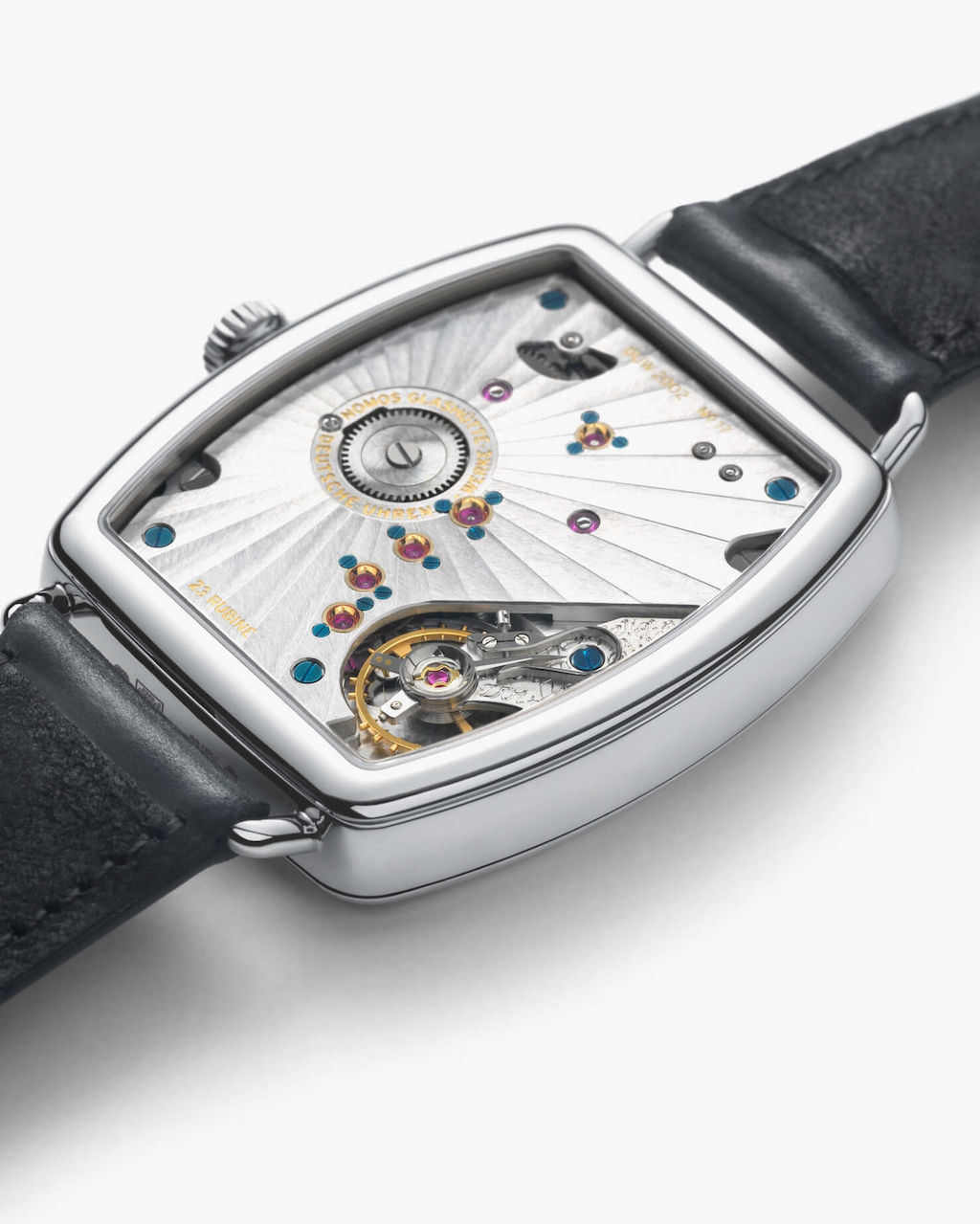
Taking care of the watch
1. Case
The casing of most of our watches is made from nickel-free stainless steel and sapphire crystal glass. The only thing harder than this glass is a diamond. In order to protect the steel, it is very slightly raised.
The cases of the golden NOMOS watches are made of 18 carat gold—as beautiful as they are precious. Since gold—both rose and white gold—is softer than steel, for example, you cannot prevent minor scratches—but it also records its life, the most beautiful way to tell your story.
2. Water-resistance
If your NOMOS watch is water resistant to 20 or 30 atm, you can go diving with it in accordance with the applicable DIN standard. A water resistance of 10 atm means that a watch is suitable for swimming or snorkeling. All other NOMOS models are water resistant up to 3 or 5 atm and prefer to stay dry. They are splash-proof, which means you can wash your hands with them, but it is better to take them off when swimming. It is also advisable to have the water resistance of a mechanical watch checked once a year by a retailer—it's a very quick process.
Please note: Ahoi, Tangente Sport and Club Sport neomatik 42 date, and Club Sport neomatik Worldtimer have screw-down crowns. Please screw it back in fully after each use to ensure that your watch remains water resistant. To do this, press the crown lightly against the case in the home position and turn it clockwise until you feel a clear resistance. Also important: Never pull out the crown under water. The pusher and the corrector point of Club Sport neomatik Worldtimer should also not be operated under water.
3. Magnetic fields
Magnetic fields can harm all mechanical watches, so it’s best to avoid them. If you notice any fixed rate deviation, your watch could have been magnetized. A watchmaker can fix this quickly.
4. Service
A mechanical watch should undergo a complete servicing around once every five years. This involves cleaning and replacing the watch oil lubricating it. We recommend you to take your watch to your retailer for this servicing.
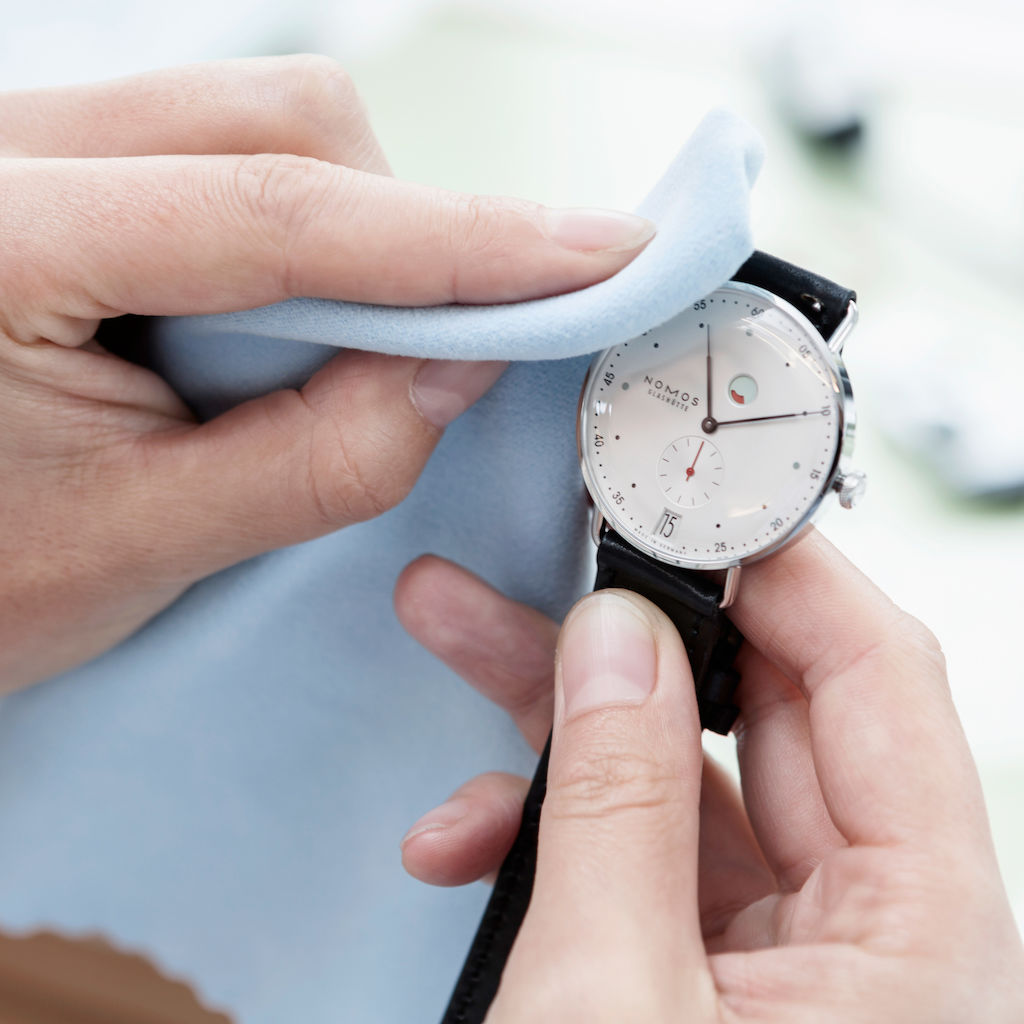
Is your watch fitted with a bracelet?
NOMOS Glashütte now offers three options in stainless steel: a thin metal bracelet and the link bracelets Sport and Club Sport. All are made exclusively for NOMOS Glashütte, are particularly durable and extremely comfortable to wear. The length of the metal bands can be quickly and easily adjusted to fit your wrist. They do not require any special care, but should be gently rinsed with lukewarm water and dried with a soft cloth from time to time. Heavy deposits between the links can be removed with a mild soap solution and, if necessary, a soft toothbrush. Then rinse with water and dry. However, please make sure that your watch is suitably water resistant first. If it is not water resistant to at least 10 atm, the bracelet must be removed from the case before cleaning.
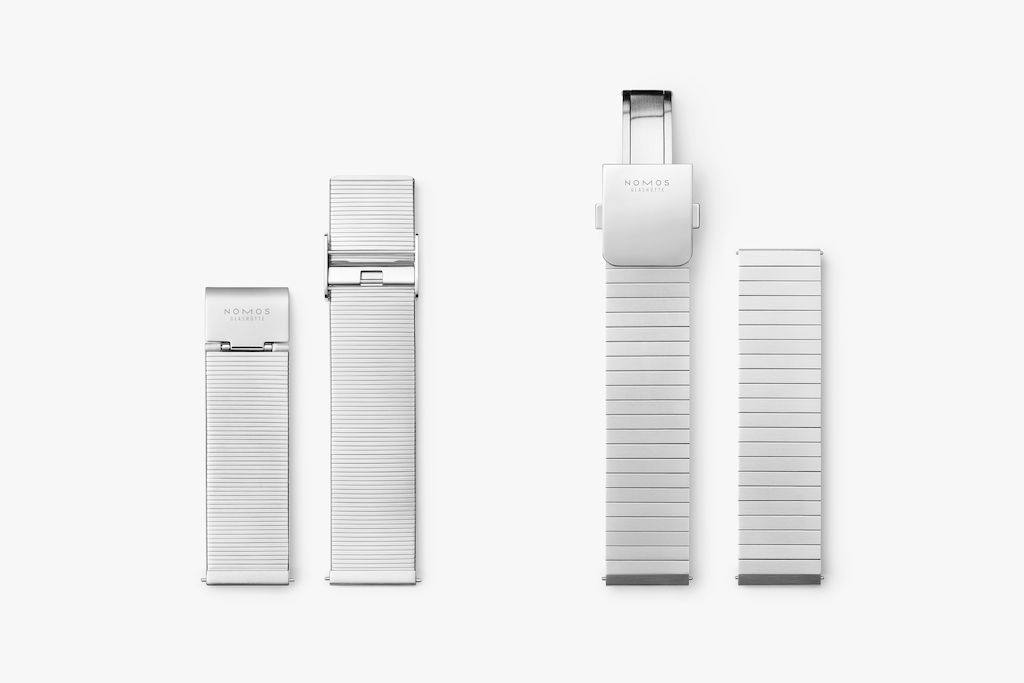
Bracelet
Thanks to its practical clasp, the NOMOS bracelet is easy to adjust in length: Open the clasp on the back of the bracelet by pushing the buckle upwards, for example with the aid of the NOMOS watchstrap replacement tool. Slide the clasp to the desired position—paying attention to the preset grooves—and close the buckle again.
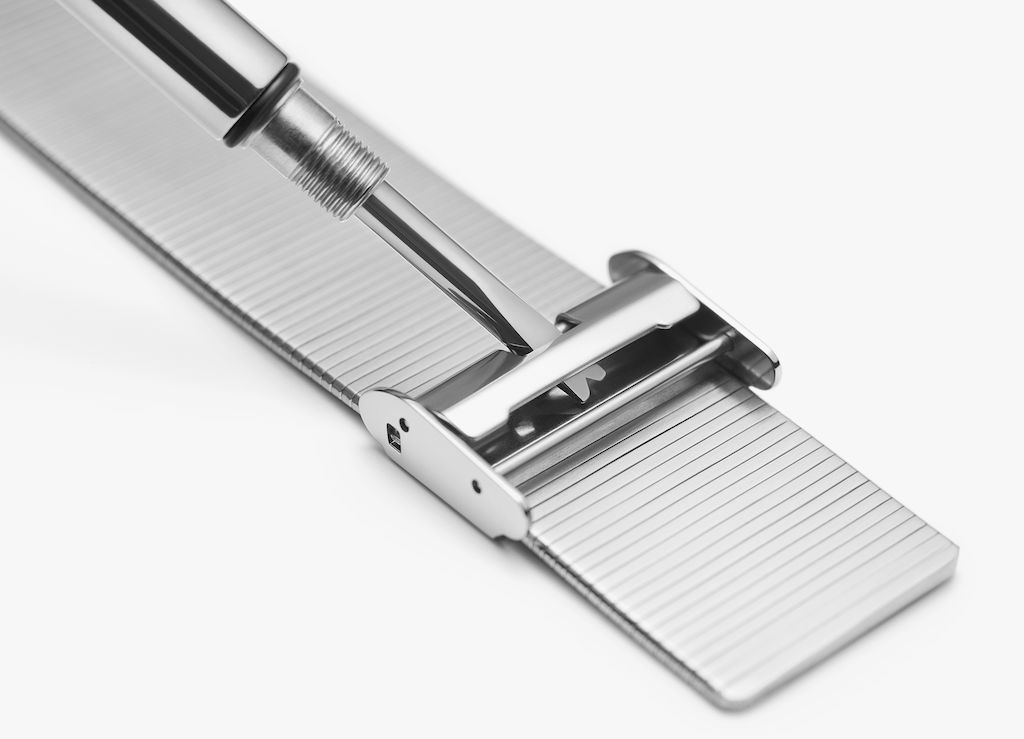
Sport bracelet
The length of the NOMOS Sport bracelet can
be adjusted by adding or removing individual links. To do this, open the bracelet and use the quick adjustment pins to release the bracelet from the clasp. The surplus links can be detached and removed on the reverse side of the bracelet using a screwdriver (blade width 1.0 mm). Then screw the bracelet back together and reattach it to the clasp.
Find out here how many links you need to add or remove so that your Sport bracelet fits your wrist perfectly:
Use strap advisor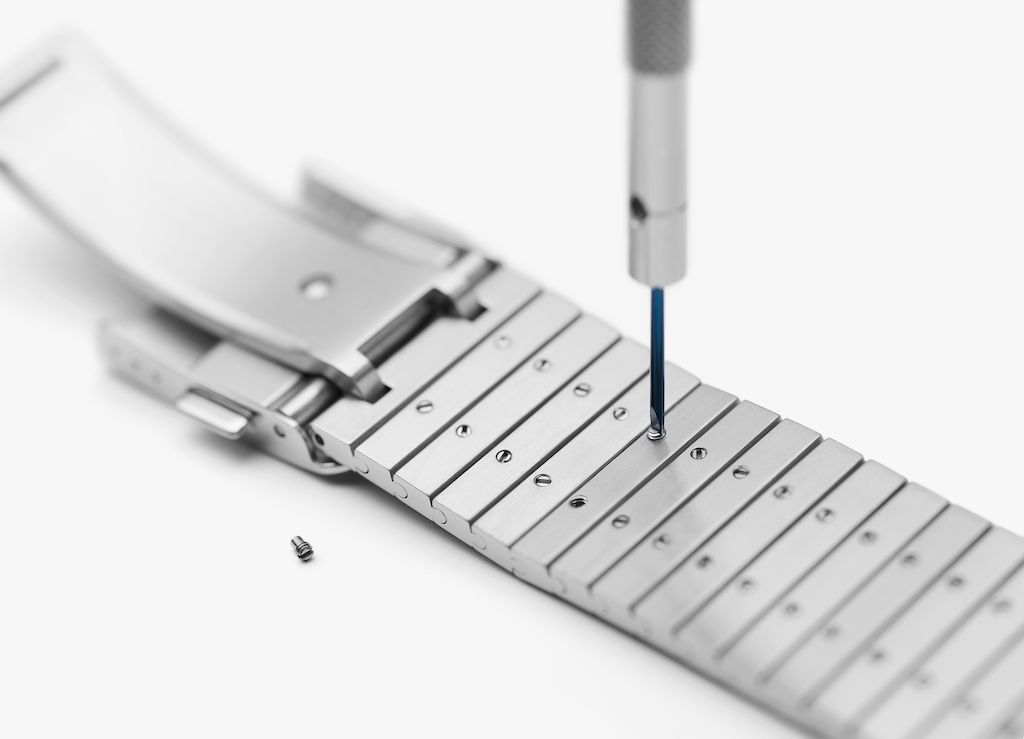
You can compensate for minimal changes to the Sport bracelet using the quick adjustment pinholes—in summer or winter, the circumference of the wrist frequently changes due to the temperature. For quick adjustment, squeeze the two pins of the last link below the clasp and slide the bracelet back or forth a little until it locks into place again.
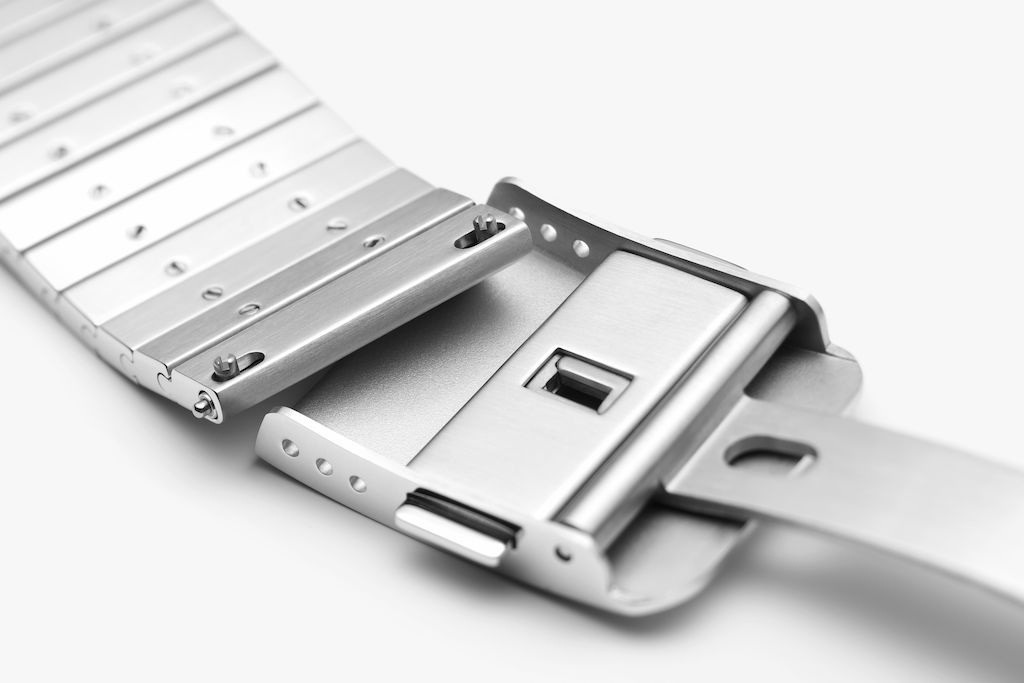
Would you like to change your bracelet?
Thanks to integrated quick-change spring bars, attaching and removing your bracelet is effortless. We’ll show you how to do it in our strap exchange guide.
Discover now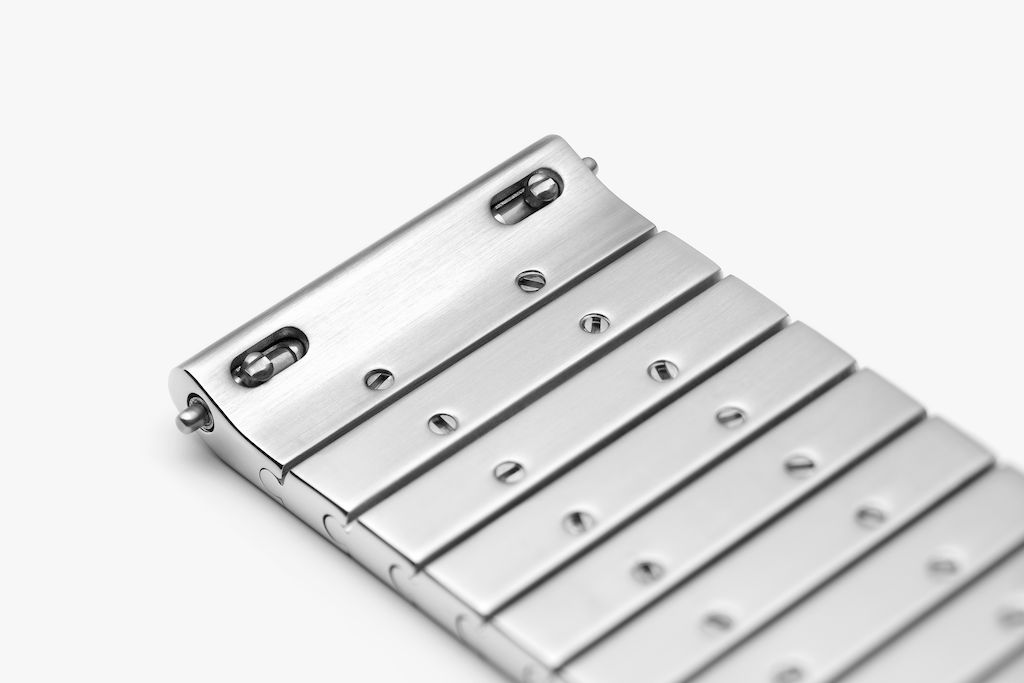
Club Sport bracelet
You can adjust the length of the NOMOS Club Sport bracelet to any size by adding or removing individual links. For this you will need the Club Sport tool set. Lay the bracelet on its side in the provided strap-holding block on a non-abrasive surface. Position the bracelet so that the pin can be pushed down and out without obstruction. The surplus links can now be detached with the pin removal tool included in the tool set (pin diameter 0.8 mm) and a watchmaker's hammer. The pins can be hammered in and out in both directions. Pay attention to the falling pins and the fixing sleeve when removing them.
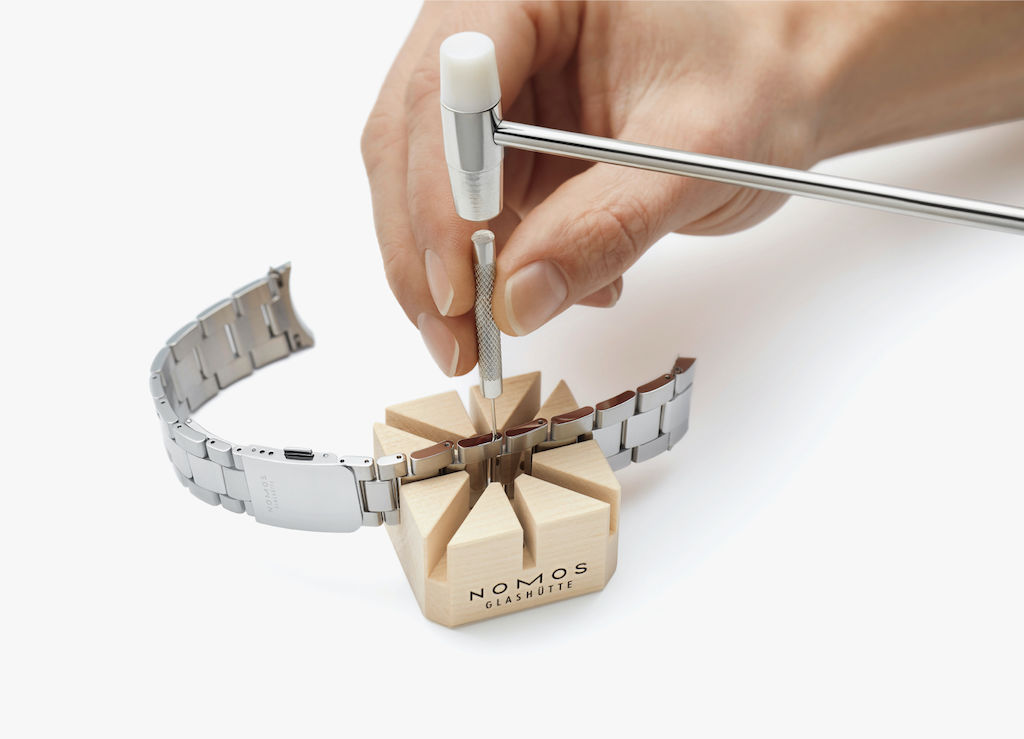
Now reinsert the fixing sleeve and reconnect the links. Using the plastic end of the hammer, you can carefully tap in the pin. Then check that the pin is fitted securely from both sides.
Find out here how many links you need to add or remove so that your Club Sport bracelet fits your wrist perfectly:
Go to the strap advisor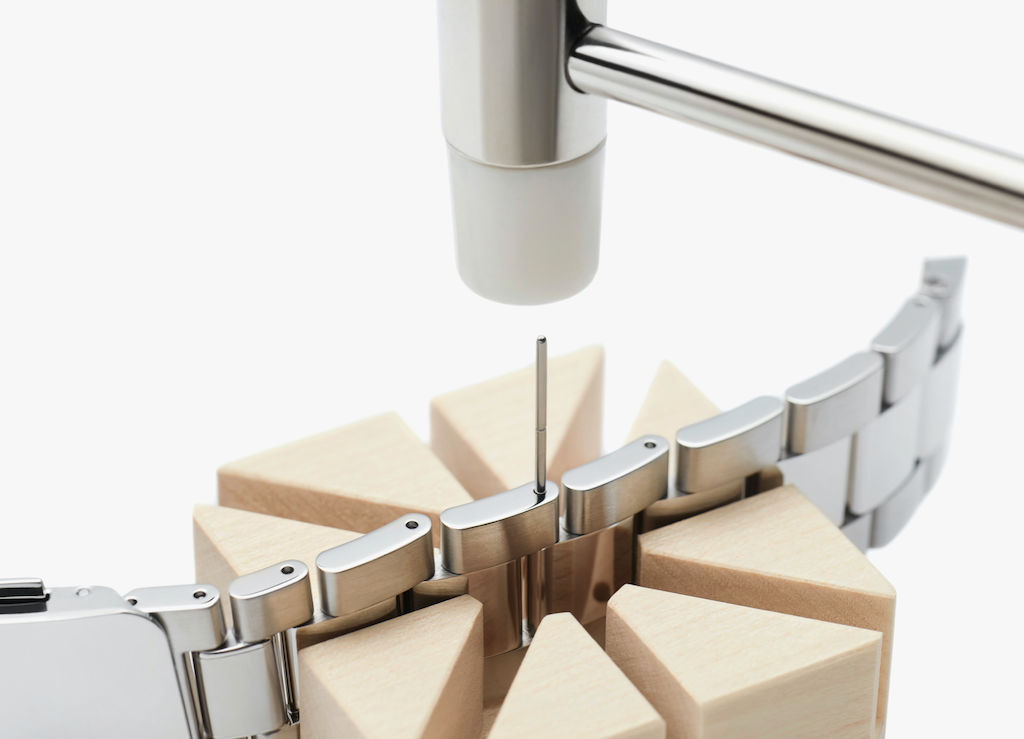
How to use the new deployant clasp
Your retailer can mount this NOMOS deployant clasp onto your strap in a moment. With a little finesse and two screwdrivers (with a 1.6 mm wide blade), you can also do it yourself.
Please check every so often whether the screws of your deployant clasp are still sitting tight—and readjust them if required. To be on the safe side, you can use a drop of screw lock lacquer on the head of the screw before tightening.
to the video tutorial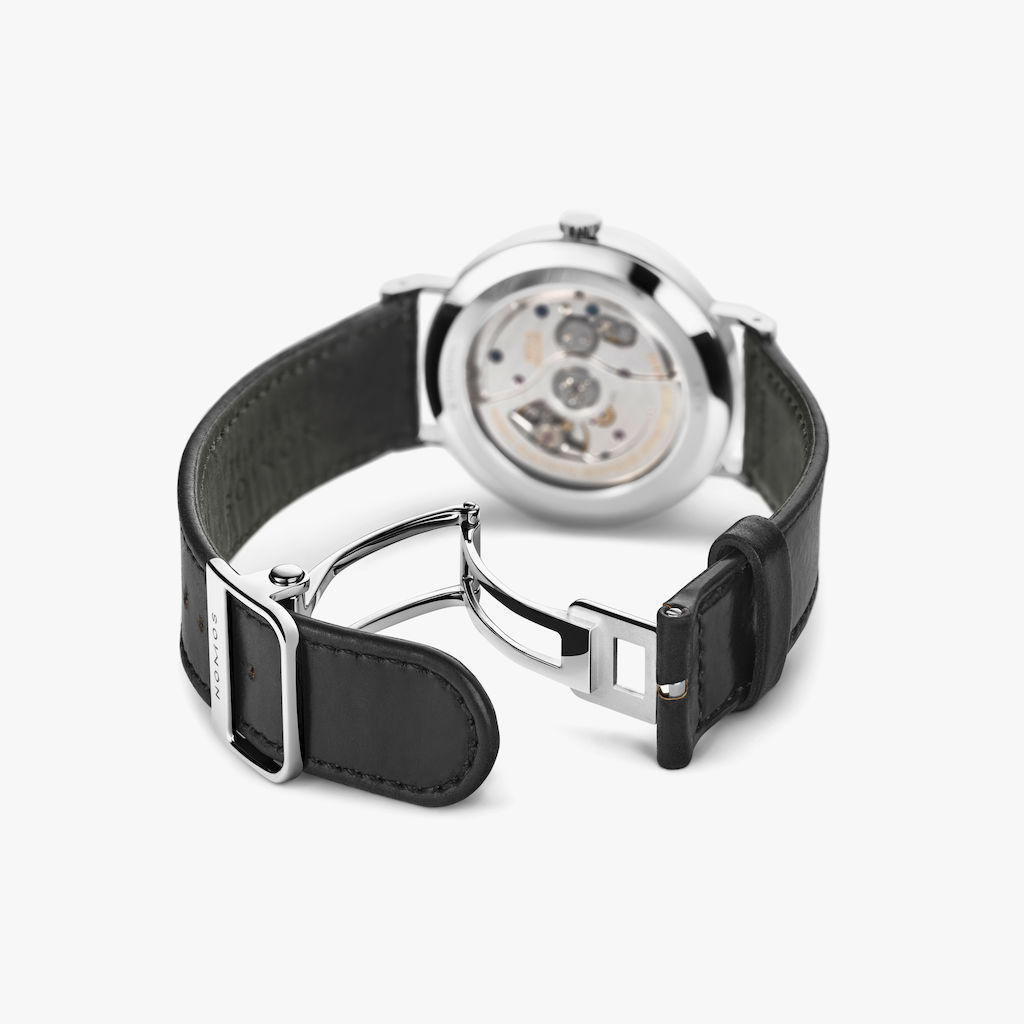
How do I change the strap on my NOMOS watch?
Dark Horween Genuine Shell Cordovan, light velour leather, or waterproof textile? Learn how to give your wrist a whole new look (with just one watch!) in our strap exchange guide. All you need is a NOMOS watch strap replacement tool—and a few minutes’ time.
To the guide